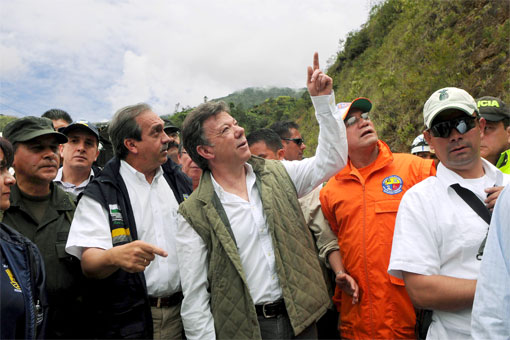Americas Quarterly: During your first year in office, flooding displaced or affected nearly 7 percent of the population. What are your short-term plans for helping the affected citizens and recovering from the predicted 2.5 percent drop in GDP that your government estimates this natural disaster will cost?
Juan Manuel Santos: First of all, I don’t think it will be a 2.5 percent drop in GDP. On the contrary, when we start reconstructing what the floods damaged in terms of infrastructure, it might have a positive effect on our growth.
Concerning the short-term plans, we are helping those people look for a place to sleep and bringing them basic services. We are also finding alternative locations for children to attend school, because many schools have been destroyed or flooded.
In the long-term, we have created a fund to finance the reconstruction of public works to adapt ourselves to this new reality of climate change, because we have to be aware—and the world should be aware—that this type of phenomena will become more frequent because climate change is irreversible. That is a major challenge for us, but we are determined to follow through, because our commitment is to make Colombia better than it was before the disaster.
AQ: Your administration has placed increasing focus on the second phase of the security policy, with a greater emphasis on development and poverty reduction. What have been your priorities in this area and what do you expect the results to be by the end of your first presidential term?
Santos: Security is one of our priorities, but the others are creating formal jobs and reducing poverty. They are all connected. You need security in order to have investment and growth, and you need investment and growth in order to create employment and reduce poverty.
We hope to reduce poverty from 45 percent to at least 38 percent. We aim to lift at least 350,000 families out of extreme poverty, and we want to bring unemployment down to one digit. That is our promise and we are working very hard to achieve those objectives.
AQ: On October 12, the U.S. Congress ratified the U.S.–Colombia Trade Promotion Agreement. What are the next priorities for strengthening the U.S.–Colombia trade relationship?
Santos: Now that the free-trade agreement is passed, we will concentrate on other items on our agenda that are of mutual concern and that will bring us both great benefits if we work together. Some of these issues include the environment, education, technology transfer, and attracting more U.S. investment.
It is also important to note that Colombia has the experience to help other countries across the hemisphere in their efforts to confront organized crime and drug trafficking.
AQ: What can you tell us about the economic issues you discussed in the most recent UNASUR meeting in August 2011?
Santos: At the UNASUR extraordinary meeting, we all expressed our concern about the debate in the United States about raising the debt ceiling, because the effects on Latin America have been very negative.
On one side, the appreciation of our currencies is destroying jobs; on the other, Latin America sits on $700 billion in reserves which lose value every time the dollar weakens. We cannot simply be bystanders from a financial point of view. We are trying to get together to see what kinds of measures we can take in order to protect our economies from these negative circumstances.
AQ: Colombia’s relationship with Venezuela has improved dramatically since you took office, with repeated gestures of goodwill between you and President Hugo Chávez. What are the direct results of this improved relationship for the Colombian people? How will the recent revelations by the International Institute for Strategic Studies (IISS) report on the seized FARC computer files affect relations?
Santos: The improvement of our relations with Venezuela has been a win-win situation. We have won in every aspect: security, investment and mutual cooperation. This doesn´t mean that we agree on everything, but we have agreed on respecting our differences.
Concerning the revelations made by the IISS, we have decided to look toward the future and not the past.
There is a strong and clear commitment from the Venezuelan government not to allow guerrillas to stay in their territory, and so far they have been giving us clear signals in that direction. For example, members of the FARC have been arrested in Venezuela and this was very important for us.
AQ: In 2010, Colombia attracted nearly $2.9 billion in investment in the petroleum sector—up from $449 million in 2002. With this increased investment in energy and mining, there are concerns about “Dutch Disease” affecting Colombia, given the infusion of capital and the likely hard currency boom from exports. What are your plans to avoid an overvaluation of the currency and the development of non-commodity-based industries?
Santos: We are investing in other sectors besides oil and minerals and we are also pursuing a responsible policy to avoid greater appreciation of the Colombian peso. We have reformed the constitution to allow us to save a good portion of our royalties in a fund outside the country. That way, money will not come in and distort the exchange rate. This is something that Chile and Norway have done with relative success, so we are doing everything we can to avoid “Dutch Disease.”
We have also been taking measures to prevent overvaluation of our currency and have held discussions with Mexico and our UNASUR partners to set a common approach to protect ourselves from the speculative capital that is affecting our currencies.
AQ: The Victims Law recognizes the situation in Colombia for the first time as an “armed conflict.” What does this new legal status mean for negotiations with the FARC and ELN?
Santos: The truth is that we have had an armed conflict for many years. Concerning possible negotations with FARC and ELN, I have been clear that we have not closed the door to negotiations; we are prepared to start an open dialogue if the FARC and ELN show us a genuine commitment and will.




